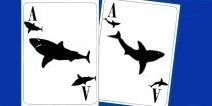|

Join our Newsletter
& get our free guide Starting Hands Revealed
We hate spam too!
We value your privacy and never share your email. All our emails have an opt-out link. Click it, and you will never hear from us again. pokerstars marketing code
in various languages
pokerstars review
in various languages
|
Counting Outs In OmahaDo you know how to count outs properly?Poker is one of the most popular games in mobile casinos or live ones too. But in games like Hold'em and Omaha there are a few players who are able to count the outs properly. Other players do not consider counting outs and these are often the loose or loose aggressive players. Counting outs is often very difficult and this is one of the complex strategies which is used by the professional poker players. Other players do not even have a clue on what they need to calculate. The correct procedure in counting outs is that a player should first of all analyze his or her hand and the hands that you will possibly play against. Many players fail to calculate their outs and the end result is that they tend to under estimate the power of their hand or call with hands that have very low effective outs. Therefore, when counting outs, you should be able to analyze both your hand and your opponents so as to weight the power or strength of your hand. The other aspect in counting your outs effectively is that you should consider analyzing your opponents in the way they make their bets. Especially when playing Omaha hi-lo most opponents tend to reach to the river not because of bluffing but due to the fact that they will be aiming to win the pot with either the low hand or high hand. When counting outs, you should be able to check if you do not have a good hand and also to check whether if your hand is able to improve to a good hand. Is the chance of winning the hand slim or large? Therefore, you would have to start counting the cards that can possibly develop your hand into a good hand. Even if the chances of improving your hand are as low as 10% you certainly have to put this into consideration. For example, if you have made a calculation that on the flop there are possibly 10 cards that will improve your hand to a good hand then you will be able to judge your outs effectively to make a better draw. For instance, is you are holding J-10-9-X unsuited, and on the flop the community cards show Q-8-4 with two hearts. In your reasoning, there are a few cards that can improve your hand to a straight and at the same time developing a flush. In your calculation it will be that you have nine outs and your opponents have the possibility to make a straight draw. According to the decisions made on the table you should be able to make adjustments. If your calculations were that you had 9 outs on the flop then your estimation would be that you can judge to have 7 or eight outs that will effectively improve your hand. If you estimate your opponents to have 13 or 14 outs then this would mean that there could be a redraw against you. You also have to analyze your potential redraws. For example, if you are playing pot or no limit you are able to bet your opponents off their draws but if you are playing a limit game, your opponents will draw their bigger hand to the river. Also when calculating your pot odds in Omaha Hi-Lo "or any split pot poker game" remember that if you are playing only the high or low hand that your pot odds are going to be half of the normal calculations made in a game like Holdem because you are only playing for half the pot. We'll go further into pot odds for Omaha in another article though.
|










